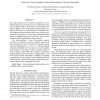Free Online Productivity Tools
i2Speak
i2Symbol
i2OCR
iTex2Img
iWeb2Print
iWeb2Shot
i2Type
iPdf2Split
iPdf2Merge
i2Bopomofo
i2Arabic
i2Style
i2Image
i2PDF
iLatex2Rtf
Sci2ools
154
click to vote
ICASSP
2011
IEEE
2011
IEEE
ECG for blind identity verification in distributed systems
This paper discusses ECG biometric recognition in a distributed system, such as smart cards. In a setting where every card is equipped with an ECG sensor to record heart beats from the fingers, and to subsequently perform identity verification, the interest is in protecting the card holder from a set of unknown/unseen biometric traits. Prior works have examined ECG biometrics in settings where a particular subject was to be identified among a set of enrollees. However, this treatment limits the applicability of this biometric. The Autocorrelation - Linear Discriminant Analysis (AC/LDA) is revisited, to propose a strategic extension of the methodology, in order to account for recognition among unknown individuals (blind verification). The discriminant is trained individually for every smart card, on the samples of the subject to be enrolled, as well as a generic dataset of ECG recordings. This enables the recognizer to protect the template against attacks by biometric samples that ...
Biometric | Card | ICASSP 2011 | Signal Processing | Smart Card |
Related Content
| Added | 21 Aug 2011 |
| Updated | 21 Aug 2011 |
| Type | Journal |
| Year | 2011 |
| Where | ICASSP |
| Authors | Jiexin Gao, Foteini Agrafioti, Hoda Mohammadzade, Dimitrios Hatzinakos |
Comments (0)

